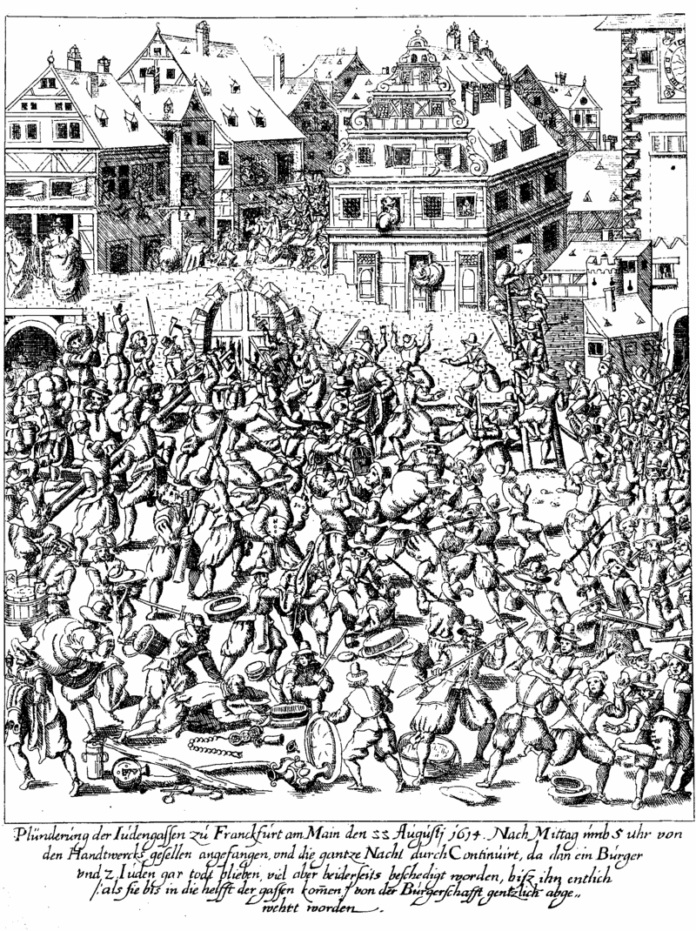
Those who do not know the past are condemned to repeat it. – George Santayana
This, more than anything else, is what I have realized in the past year and a half since October 7th, 2023.
As a Catholic convert from a Jewish background and as an Israeli-Canadian, the complicated history of antisemitism and the Catholic Church has overshadowed the last few years of my spiritual life.
Growing up, I heard horrible things about Christians, especially the Catholic Church. I was acutely aware of the forced conversions and expulsions my own family experienced in Spain and Portugal in the Inquisition. After we had moved to Canada from Israel, every Easter, my father would warn me to stay away from Christians, recounting tales of Christian persecution of Jews during Easter, and of the passion plays that inspired pogroms, specifically in Poland, before the Holocaust.
I, on the other hand, felt very detached from the long history of religious, political, and racial discrimination against Jews in Europe. Although my grandmother escaped Nazi persecution in Tunisia as a young child and then fled to Israel at age 20 to escape Muslim persecution, antisemitism, especially Christian antisemitism, felt so far removed. That was a thing of the past, I would tell him. How could Christians be antisemitic when they accept the Old Testament, when the first Christians were Jewish, when their God came into the world as a Jew?
At age 13, while attending public Catholic school in Ontario, I converted to Catholicism after feeling a sense of peace and belonging I had never experienced in my life during Mass. I did not really know who Jesus was, or what it meant to be Catholic, but I knew I wanted to follow Him.
On the Feast Day of Our Lady of Fatima, May 13th, 2017 I was baptized. My father and extended family did not understand why I would betray the sacrifices my family had made to escape forced conversion, but like the loving family they are, they accepted my decision and looked for the good in it. After all, things had changed. Pope John Paul II visited Israel and apologized for the Church’s history of antisemitism. Christians support Israel now.
On October 7, 2023, everything changed. My family members in Israel lived near the border with Gaza. My family lost seven friends. A friend of ours in Kibbutz Beeri lost eleven members of her family. Three terrorists tried to infiltrate my grandparents’ kibbutz, but thanks to the quick response and sacrifices of the army, they survived and were evacuated the next day.
For the next few months, I grieved alone, feeling abandoned by the world, the Church, and even God Himself. Why did you choose us? I asked Him. To slaughter us, time and time again? Never before had David’s words in the Psalms and then again Christ’s words on the Cross spoke to me as deeply as they did then – My God, my God, why have you forsaken me?
Slowly, Christ pulled me back to Himself. I did not understand, and still now I don’t fully understand, but I trust in Him. After all, where else would I go? Christ alone has the words of eternal life.
These are the words I have clung to and continue to cling to as remaining in the Church becomes increasingly more difficult. The far removed history of the Inquisition, of the Crusades, of pogroms, has become my story. Terror attacks on Jews and Israelis has unfortunately become a common occurrence in the United States and Canada over the last two years, and it will probably continue to worsen.
These attacks, and the online media environment that feeds them, is largely made up of radical Islamists and the radical left and right-wing. Nevertheless, there are some Catholics online who have failed to stand against this tide of antisemitism, and in some cases, contribute to it, even going so far as to politicize an innate truth of our faith, Christ is King.
This is not just limited to the internet. As a recent graduate from a Canadian Catholic university, the complicated history of the Church and antisemitism shaped my university experience. I have personally dealt with blood libels, rhetoric that blames current Jews for the death of Christ, and have been told “Free Palestine” by fellow classmates and Catholics. I have been discriminated against by my university chaplain and priest for the crime of being Israeli, and blamed for the deaths of thousands of Palestinians I have never met. My university has been vandalized by antisemitic graffiti, my security jeopardized. My own traumas have been silenced, all by members of my university and my own faith community. Anti-Israel and anti-Jewish rhetoric that undermines the everlasting promise made by God to Abraham haunted me from the classroom to the pew.
This is not to say that this is the Church’s position, or that this is the majority of Catholics. I have met incredible Catholic priests, bishops, and friends who have been the hands of Christ in my life. Nor does this compromise the truth – that Christ, the Jewish Messiah, has fulfilled the promises of God, established the Catholic Church, and will come back again to establish His Kingdom, where He will reign forever.
What it does do is compromise our witness to the truth. The stories my father told me and the stories all Jews hear growing up about the persecution of Jews by Christians were not fairytales – they were real actions taken by some Christians. Forced conversions and expulsions in France in 626 and Spain in 694 happened. The persecution of German Jews by the Crusades in the 11th century happened. The Inquisition in the 15th century happened. Russian pogroms happened. And although none of these events were Church policy, the involvement of some Catholics – and perhaps more importantly – lack of sufficient resistance by other Catholics, has marred Jewish perception of the Catholic faith, so much so it is considered a betrayal to convert to the faith, even among the most secular Jews.
I believe that the Church again finds herself at a crossroad. She can either take a strong stand for the truth, or she can allow her legacy to be marred by certain Catholics.
This is not the first time the Church has found herself in this position. In the turmoil of the Great Depression and the aftermath of the Great War, hundreds of years of Jewish prejudice and persecution culminated in the Holocaust. This tragedy, which took the lives of six million Jews, came from outside of the Church, like antisemitism today, and from the beginning was condemned by the Church. In 1937, Pope Pius XI issued the encyclical “Mit brennender Sorge” (‘With Burning Sorrow’) condemning the racist ideology of the Nazis. The letter was smuggled into Germany by the bishops and read in German churches.
During the Holocaust, priests and Catholic laity such as St. Maximillian Kolbe, Angelo Roncalli (later Pope John XXIII), and so many others, put their lives on the line to save Jews from concentration camps. Pope Pius XII himself ordered the falsification of baptismal certificates for Jews to smuggle Jews out of Europe, and hid untold numbers in the Vatican at great personal risk. The Pope’s charity impressed the Chief Rabbi in Rome that in 1944 he converted to the Catholic faith, taking Pius’ original name, Eugenio, as his own.
Pope Francis, in his papacy, did not live up to Pope Pius XII’s legacy. Throughout the current war, he criticized Israel for its cruelty but failed to recognize the deaths of Kfir and Ariel Bibas, two Israeli children kidnapped on October 7th and strangled to death, as well as other hostages. He neglected the Hebrew Catholic community within Israel, while calling the Gazan Catholic community every night. He had a Nativity Scene in the Vatican with Jesus in a keffiyeh, obscuring the Jewish identity of Christ.
This is my hope for Pope Leo XIV. That he will live up to the legacy of Pope Pius XII, that he will stand against antisemitism within and outside the Church, that he will serve as a powerful witness that pulls our elder brothers into the fullness of Christ and embraces those already in the faith.
Now is the time to be a saint.










